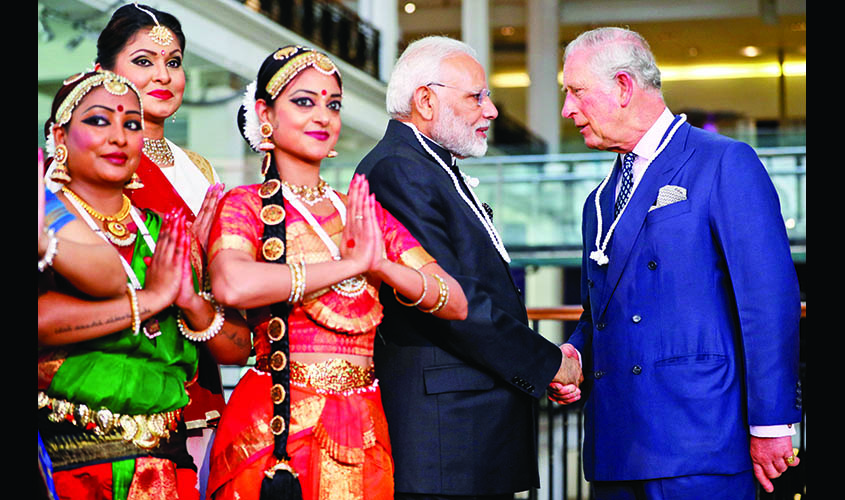To compound the difficult start to CHOGM, during a debate in the House of Lords, Lord Ahmed Nazir asked Her Majesty’s Government some questions requesting support for India withdrawing its formal reservations against the right of self-determination in Indian Kashmir, Punjab and other territories in the Northeast.
The week of the Commonwealth Heads of Government Meeting (CHOGM) began badly for the UK Prime Minister, with the crisis about the Windrush citizens of UK. The immigrants who arrived from the Caribbean in the 1940s, found that their landing papers had been destroyed as recently as 2014, leaving them without the necessary evidence that entitled them to permanent citizenship. Initially, Theresa May announced she would not meet with the representatives of the 12 countries affected, but the distress was so audible that she was forced to apologise and promise them a permanent home with all the welfare that goes with citizenship. This episode brought under scrutiny Theresa May’s, when she was Home Secretary, anti-immigrant policies that have been labelled hostile and according to Lord Kerslake “almost reminiscent of Nazi Germany”.
To compound the difficult start to CHOGM, during a debate entitled “India: Right of Self-determination” in the House of Lords, Lord Ahmed Nazir asked Her Majesty’s Government some questions requesting support for India withdrawing its formal reservations against the right of self-determination in Indian Kashmir, Punjab and other territories in the Northeast; these questions were designed to antagonise both India and UK, but were efficiently exterminated by Baroness Stedman-Scott.
Despite the admirable efforts of HM Queen Elizabeth II and the royal family, especially HRH Prince Charles, the Commonwealth has had a drab profile recently. It is hoped that CHOGM will redefine the Commonwealth for the 21st century and introduce a new sense of purpose.
Prime Minister Narendra Modi arrived looking fresh and animated from his successful Scandinavian bilaterals. In a gesture of his esteem, Boris Johnson, Foreign Secretary, met Modi on the airstrip in the middle of the night. Outside his hotel and in Westminster Modi enjoyed a feverish welcome from hordes of UK NRIs. Unusually, Modi did not personally tweet till three hours after his meeting with PM May, during which he spoke in Hindi; it was noted that when President Valdimir Putin is overseas he also speaks in his national language. Perhaps Modi is the first to speak in Hindi since Mahatma Gandhi’s visit to No. 10; apparently, he reiterated his respect for Bhagwan Basaveshwara, bringing Lingayat politics and the Karnataka election to centre stage of the British government in the iconic White Room at 10 Downing Street.
In 2015, David Cameron and Modi held a joint press conference and took questions together. No such luck in 2018; a communiqué from the government and a joint press statement will have to suffice.
Protestors from assorted minority groups attempted to spoil the mood by reaching up to the Indian national flag flying in Parliament Square, tearing it down and setting it alight—a gesture guaranteed to inflame Indian patriotic sentiments. The media went into a trans-continental overdrive, but security forces were quick to reinstate a new flag. There were also reports that the protestors unpleasantly pushed and shoved some of the Modi supporters.
Modi then arrived to join Prasoon Joshi in Central Hall, Westminster, for his “Bharat Ki Baat Sabke Saath”, a live audience and live-streamed flagship event. This was essentially an outreach programme. UK NRIs offer tremendous financial and moral support to India, a party political broadcast for the BJP and the cult of the Modi wave. The audience was predominantly NRIs, with many VIPs including Lord Loomba, Lord Desai, Lord Gadhia and Virendra Sharma, Labour MP. This reporter only spotted two white Britishers—Lord Popat’s assistant was in the front row and Alan Gemmell, Director British Council Group in India, who was wearing a translation device. No British Conservative MPs were apparent. Those who were not in the auditorium followed the interview on social media; rapturous applause greeted Modi as he entered to the Mann Ki Baat theme tune. Joshi invited the PM to tell his story. To this reporter’s mind Joshi used his poetic licence to talk too much. A professional interviewer might have taken the PM more interestingly off script. However the audience was committed and lapped up the humble personality and the incredible India narrative from the PM.
India’s critics are calling for a tolerant, egalitarian and transparent India; it would be a bonus to have a tolerant, egalitarian and transparent bilateral relationship with India. During the week of CHOGM this reporter regrets there was not more obvious integration; maybe another time we will get a meaningful and inclusive event that includes British politicians, business leaders, journalists and citizens of all ethnicities. Thus, in the common language of the Commonwealth we could gain more cultural understanding of each other, how to develop the Commonwealth for the benefit of everyone and determine how to make a common success of Brexit.

